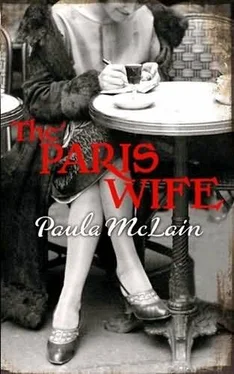It wasn’t under my seat. I didn’t see it anywhere.
In a panic, I called for the conductor.
“Is there something I can do?” my seatmate said while I waited for him to appear. She was a middle-aged American who seemed to be traveling alone. “I can lend you something of mine to wear.”
“It isn’t clothing!” I shrieked, and the poor woman turned away, understandably horrified. When the conductor finally arrived, he didn’t seem to understand, either. I couldn’t stop crying long enough to find the right words in my terrible French. Finally he called over two French policemen, who led me outside the train and interrogated me while everyone stared. They asked for my identification cards, which one officer examined while the other asked me to describe the bag and my actions in detail.
“It was yours, this valise?”
“My husband’s.”
“Is he on board?”
“No, he’s in Switzerland. I was bringing it to him. It’s his work. Three years ’ worth of work,” and here I lost any remaining composure. I felt sick with rising dread. “Why are you standing here questioning me?” My voice pitched shrilly. “He’s getting away! He’s probably long gone by now!”
“Your husband, madame?”
“The thief, you idiot!”
“We cannot help you if you’re going to be hysterical, madame.”
“Please.” I felt as if I might lose my mind. “Please just search the train. Search the station.”
“Can you estimate the value of the case and its contents?”
“I don’t know,” I said in a fog. “It’s his work. ”
“Yes, so you said. We’ll do what we can.” And the two men walked off officiously.
The conductor agreed to hold the train for another ten minutes while the police performed their search. They walked from one end of the train to the other asking the passengers if they’d seen the bag. I didn’t for a moment believe that whoever had stolen it was still on the train. It had obviously been a common pickpocket who’d seen an opportunity and taken it, hoping for valuables. Instead, it contained every thought and sentence Ernest had sweated over since we came to Paris and well before, the Chicago stories and sketches, every poem and fragment. He never threw anything away, and it was all there.
The two officers came off the train empty-handed. “Nothing yet, madame,” one of them said. “We’ll continue to look, but if you still intend on traveling to Switzerland, I suggest you take your seat.”
I gave them our address and the phone number for the dance hall, since there wasn’t a phone in our apartment, but I didn’t hold out much hope they’d succeed in their efforts. Paris was vast and too much time had passed. I imagined the thief hurrying to an empty alleyway, opening the case and then shutting it immediately. He’d have dropped it where he stood or pitched it into a rubbish pile. It could be in any alleyway or gutter or burning trash barrel in Paris. It could be listing, at that moment, toward the bottom of the Seine.
“I’m very sorry for your trouble,” my seatmate said when I’d finally made my way back to the compartment.
“No, I’m sorry,” I said, beginning to weep again. “I’m not usually this discomposed.”
“Is it very dear, what you’ve lost?”
The train grumbled beneath us, then lurched away from the platform with finality. There was no stopping or changing anything now. No avoiding the truth of what had happened. I felt dread settle in to fill me completely and a new hard-won certainty. There was only one answer to her question. “Priceless,” I said, and turned away.
What followed was the longest night of my life. The mountains closed in as we headed into Switzerland, and blackness fell. I thought about how I would tell Ernest the work was gone, but I couldn’t imagine it. There were no words.
When we finally pulled into Lausanne the next morning, and I saw Ernest on the platform with Steffens right beside him, it was all I could do to stand and walk toward them. I was crying. Ernest looked at Steffens and shrugged as if to say, Who can understand a woman , but then I couldn’t stop and Ernest knew something was very wrong.
Still, it was ages before I could say the words. Steffens excused himself, telling Ernest he’d phone to arrange a meeting. When he was gone, Ernest made me sit down at a café table near the entrance of the station. All around us couples and families kissed good-bye or bade each other farewell, and they seemed so painfully untroubled to me. A fresh wave of tears came.
“What is it?” Ernest asked again and again, first worried and tender, then angry, then worried again. “Whatever it is, we’ll get through it. Nothing can be that bad.”
But it was. It was exactly that bad. I shook my head and cried harder, and it went on this way until finally I was able to tell him about packing the case and stowing it for the journey.
I didn’t need to say more. His face grew pale and very serious. “You lost it on the train.”
“It was stolen out from under me.”
He nodded, taking it all in, and I watched his eyes carefully, how they changed and steadied, changed and steadied. He was trying to be brave for me, I knew. Because he wasn’t sure what I’d do.
“You couldn’t have packed everything. Why would I need it all?”
“If you were going to be making changes in the originals, I thought you’d want the copies, too, so that everything would be right.”
“You must have left something,” he said.
I shook my head and waited. Would he snap from the strain and fly into a rage? I’d certainly earned that. I’d taken what was his-what was most his in the world-without his asking me to, as if I had that right. And now it was gone.
“I have to go back. I need to know it for myself.”
“I’m so sorry, Tatie.” I shook with remorse and heartsickness.
“It’s going to be all right. I made it. I can make it all again.”
I knew he was bluffing if not outright lying, but I held him tight and let him hold me, and we said all the words people say to each other when they know the worst has come.
Late that night, he boarded a train back to Paris while I waited in Lausanne in a wet knot. Steffens took me to dinner and tried to calm my nerves, but even with several whiskeys in me, I jangled.
He was gone for two days and sent no cable. But just as I could see myself reaching into the cupboard over and over, packing everything away in the valise, I could see him coming into the quiet apartment and discovering for himself that it was all really gone.
Turning on all the lights, he first looks at everything in plain sight, the table and the bed, the kitchen. He looks at the floor and walks between the two rooms slowly, saving the cupboard until he’s seen everything else, because that’s the last place, and there won’t be anywhere to look after and no hope left at all. He has a drink first, then another, but finally he has to see it. He puts his hand on the knob and pulls the door open and then he knows everything. There isn’t a page left in the cupboard. Not a note or a scrap. He looks and looks, standing there, wrenched out and hollow. As desolate as the cupboard is, that’s how he is too because the pages belong to him and are him. It’s like someone has taken a broom to his insides and swept them out until everything’s clean and bright and hard and empty.
When Ernest came back from Paris, he was tender with me and kept saying over and over that all was forgiven, but his eyes were bruised looking and changed. There was still work to do at the conference, and he did it as he always did, throwing himself into the day and coming home tired and glad for a drink. I passed my time walking through the town looking for gifts to send home for Christmas. Even more than our first year in France, I was desperate to see something that captured the holiday as I remembered it from childhood. I wandered for hours, peering in shopwindows, but search as I might, nothing in Lausanne looked like Christmas to me.
Читать дальше












